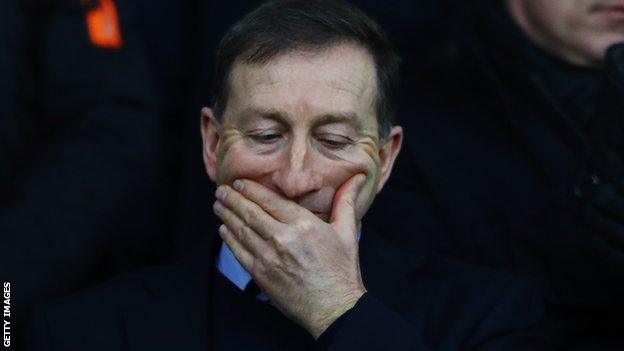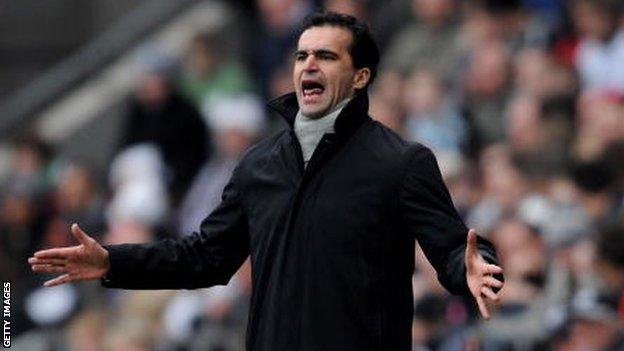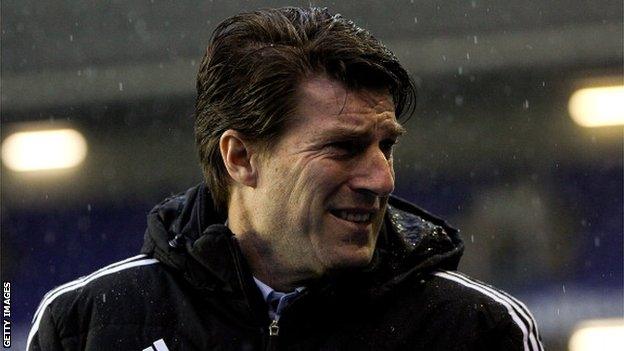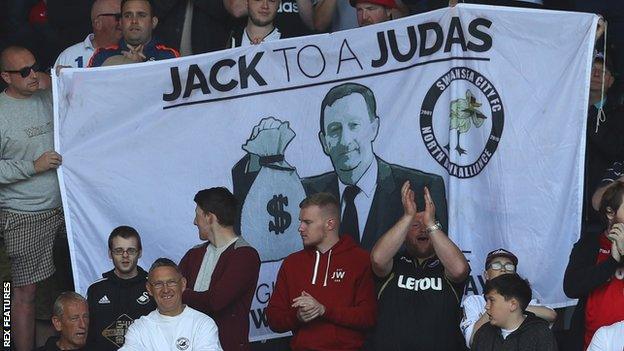Huw Jenkins at Swansea City: A golden era with a bitter end
- Published

Huw Jenkins was appointed chairman in January 2002
Huw Jenkins presided over the finest spell in Swansea City history, a golden era which eclipsed anything they had done before and may not be surpassed.
Under John Toshack's management, the Swans spent two years in the top flight in the early 1980s, finishing as high as sixth in 1982.
But under the watch of Jenkins, Swansea enjoyed seven seasons in the Premier League and claimed their first major piece of silverware in the form of the League Cup.
Yet his 17-year stint as Swansea chairman has come to an end in troubled times.
Swans have not known such trauma since the days of Tony Petty, when players were sacked and fans protested against the way their club was run on the streets.
It was that chaotic period which led Jenkins, as part of a consortium of businessmen, to take control.
What followed was a footballing fairytale, a rise from one of the end of the pyramid to the other which was so unlikely they would later make a film about it.
But the good thing came to an end.
Now, with Swansea 13th in the Championship and battling to deal with the financial ramifications of relegation from the Premier League, Jenkins is gone.
It is not the exit he would have anticipated for much of his reign.
Jenkins, after all, was once a hugely popular figure among Swansea fans thanks to that journey through the divisions.

Swansea City fans celebrate avoiding relegation out of the Football League
A Swans supporter, Jenkins had enjoyed success in the construction trade before he set about trying to build a successful football club.
After the ousting of Petty, Swansea were briefly run by committee until Jenkins became chairman.
In those early days, the challenge was to get Swansea on an even keel financially whilst ensuring the team stayed in the Football League.
Jenkins and company almost failed. Captain Nick Cusack was made manager while a squad was built on a budget.
Swansea sank to the bottom of the Football League for the first time in their history and Cusack was gone.
Jenkins turned to Brian Flynn, whose appointment as boss was the first pivotal move of his reign.
Flynn's eye for a player saw the likes of Leon Britton, Alan Tate and Roberto Martinez join Swansea's scrap to avoid the drop into non-league football.
Flynn's team triumphed - just - courtesy of victory over Hull on the final day of the 2002-03 season.
Flynn made more notable signings - none more influential than Lee Trundle - but Kenny Jackett was handed the reins in the spring of 2004.
Like his predecessor, Jackett would deliver for Jenkins, winning promotion from the fourth tier in 2004-05.
Swansea almost made it successive promotions before Jackett's departure prompted one of Jenkins's best decisions, as former midfielder Martinez became the manager.
Here was a gamble which paid off.

After taking charge of Swansea, Roberto Martinez has gone on to manage Wigan, Everton and now Belgium
Martinez led Swansea to the Championship in 2007-08, with club records tumbling as they lifted the League One title.
Not only did Martinez's team succeed, they did so playing a style of possession football which turned heads up and down the land.
After Martinez was lured away by Wigan, Paulo Sousa kept the pot bubbling for a year before he joined Leicester.
If Sousa's reign was a little forgettable, Jenkins's next move will stick in the memory.
Brendan Rodgers had been sacked by Reading, yet his team reached the Premier League by playing the sort of eye-catching football which had become a Swansea trademark.
The club that had stared into the abyss in 2003 were counting the Premier League millions just eight years later.
Though they were widely written off, Rodgers's Swansea stayed up with plenty to spare.
As a result another of Jenkins's managers was poached, as Rodgers moved to Liverpool and Swansea turned to Michael Laudrup.
The Dane spent his playing career lifting silverware and, having brought Michu to Wales, he would guide Swansea to their first major trophy as Bradford were thumped in the 2013 League Cup final.
European football followed, with Swansea - little old Swansea - winning 3-0 at Valencia during a thrilling Europa League ride.
Yet that 2013-14 season also a brought a maiden blot on the copybook, a first sign that Swansea may not be the model club they had been painted as by many for a time.

Michael Laudrup won 104 caps for Denmark and played for Barcelona, Juventus and Real Madrid
With league form questionable, Laudrup became the first manager to be fired by Swansea in more than a decade.
Garry Monk became Jenkins's next brave appointment, the club skipper moving into the dugout and masterminding Swansea's best Premier League finish - eighth - in 2014-15.
Yet Monk soon went the way of Laudrup, dismissed amid concerns over top-flight form.
Alan Curtis briefly took the reins, then Francesco Guidolin arrived to steer Swansea clear of relegation trouble.
With Guidolin's contract up that summer, Rodgers was poised for a second spell in charge - but Swansea ended up sticking with their veteran Italian.
In one of his increasingly rare media interviews, Jenkins rued the decision not to reappoint Rodgers.
The club that had made one shrewd call after another were losing their way.
It was not only the choice of managers which was coming under the spotlight.
After a string of inspired signings, Swansea now made numerous unsuccessful transfer moves.
Bob Bradley followed Guidolin into the manager's office but was quickly replaced by Paul Clement.
He did well to lead Swansea to safety in 2016-17, but the top-flight days were numbered.
Carlos Carvalhal threatened to pull off another great escape last season but left after his team stumbled into the Championship.

Swansea City fans protested at the Liberty Stadium on the day their Premier League relegation was sealed
Relegation meant Jenkins took plenty of criticism, as did the American duo, Jason Levien and Steve Kaplan, who had bought control of the club in June 2016.
Swansea had begun to face tougher times on the pitch before the change of ownership, but it is since then that Jenkins's popularity with the fans has really waned.
Flak has flown over the decision to sell, over the way the deal was done and over the path the club has since taken.
Had Swansea continued to progress on the field, changes in the boardroom may have been more readily accepted by supporters.
But the team's recent struggles - with results dipping and the 'Swansea Way' of playing being eroded - have left fans' fingers pointing towards the club's hierarchy.
With Levien and Kaplan calling the shots from the other side of the Atlantic, Jenkins remained as chairman to run the football side of the club.
While he still had some power, Jenkins no longer had the final say. Did the new set-up work? Results say no.
Swansea look to have made another smart managerial move by bringing in Graham Potter, but he is working in testing conditions.
There was an exodus of players last summer before another flurry of departures in the January window. Now Jenkins has gone too.
Swans fans used to sing about their love for their chairman, yet in recent times any chants about Jenkins have been calling for his head.
He leaves having overseen the establishment of a thriving academy and two impressive training grounds, but with the first team on the back foot, money tight and fans fuming.
The Jenkins era will be remembered for some glorious moments and a miserable end. The question now is where Swansea go next.